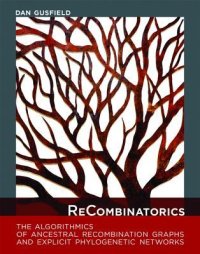
Ebook: ReCombinatorics: the algorithmics of ancestral recombination graphs and explicit phylogenetic networks
Author: Gusfield Dan
Combinatorial structure and algorithms for deducing genetic recombination history, represented by ancestral recombination graphs and other networks, and their role in the emerging field of phylogenetic networks.
In this book, Dan Gusfield examines combinatorial algorithms to construct genealogical and exact phylogenetic networks, particularly ancestral recombination graphs (ARGs). The algorithms produce networks (or information about networks) that serve as hypotheses about the true genealogical history of observed biological sequences and can be applied to practical biological problems.
Phylogenetic trees have been the traditional means to represent evolutionary history, but there is a growing realization that networks rather than trees are often needed, most notably for recent human history. This has led to the development of ARGs in population genetics and, more broadly, to phylogenetic networks. ReCombinatorics offers an in-depth, rigorous examination of current research on the combinatorial, graph-theoretic structure of ARGs and explicit phylogenetic networks, and algorithms to reconstruct or deduce information about those networks.
ReCombinatorics, a groundbreaking contribution to the emerging field of phylogenetic networks, connects and unifies topics in population genetics and phylogenetics that have traditionally been discussed separately and considered to be unrelated. It covers the necessary combinatorial and algorithmic background material; the various biological phenomena; the mathematical, population genetic, and phylogenetic models that capture the essential elements of these phenomena; the combinatorial and algorithmic problems that derive from these models; the theoretical results that have been obtained; related software that has been developed; and some empirical testing of the software on simulated and real biological data.
In this book, Dan Gusfield examines combinatorial algorithms to construct genealogical and exact phylogenetic networks, particularly ancestral recombination graphs (ARGs). The algorithms produce networks (or information about networks) that serve as hypotheses about the true genealogical history of observed biological sequences and can be applied to practical biological problems.
Phylogenetic trees have been the traditional means to represent evolutionary history, but there is a growing realization that networks rather than trees are often needed, most notably for recent human history. This has led to the development of ARGs in population genetics and, more broadly, to phylogenetic networks. ReCombinatorics offers an in-depth, rigorous examination of current research on the combinatorial, graph-theoretic structure of ARGs and explicit phylogenetic networks, and algorithms to reconstruct or deduce information about those networks.
ReCombinatorics, a groundbreaking contribution to the emerging field of phylogenetic networks, connects and unifies topics in population genetics and phylogenetics that have traditionally been discussed separately and considered to be unrelated. It covers the necessary combinatorial and algorithmic background material; the various biological phenomena; the mathematical, population genetic, and phylogenetic models that capture the essential elements of these phenomena; the combinatorial and algorithmic problems that derive from these models; the theoretical results that have been obtained; related software that has been developed; and some empirical testing of the software on simulated and real biological data.
Download the book ReCombinatorics: the algorithmics of ancestral recombination graphs and explicit phylogenetic networks for free or read online
Continue reading on any device:

Last viewed books
Related books
{related-news}
Comments (0)